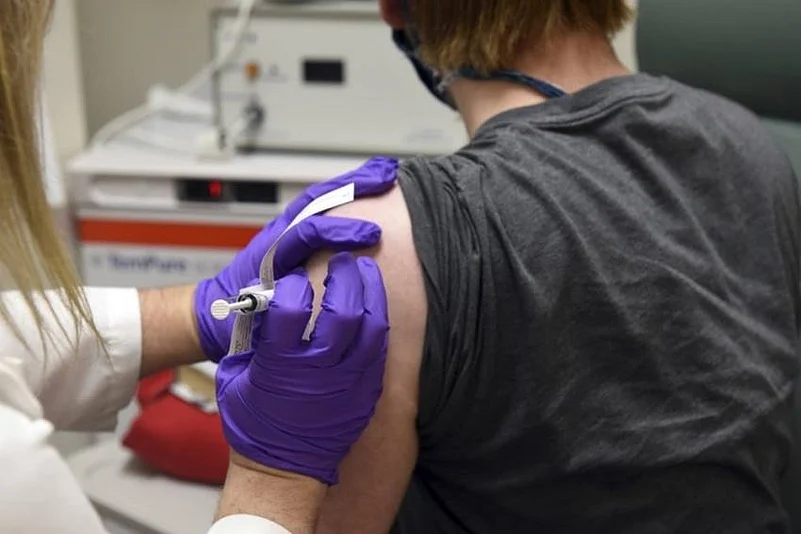A recent study on Covid-19 vaccine developed by Oxford University and AstraZeneca has shown efficacy against the UK variant of the coronavirus.
The Oxford University scientists have revealed that the "ChAdOx1-nCoV19" vaccine is effective not only for the original coronavirus but also fights against the UK coronavirus strain, called the B.1.1.7 ‘Kent’ coronavirus strain
However, in related findings, AstraZeneca said it is yet to be fully determined whether the vaccine protects against severe disease caused by the highly transmissible coronavirus variant found in South Africa.
“Data from our trials of the ChAdOx1 vaccine in the United Kingdom indicate that the vaccine not only protects against the original pandemic virus, but also protects against the novel variant, B.1.1.7, which caused the surge in disease from the end of 2020 across the UK,” said Andrew Pollard, Professor of Paediatric Infection and Immunity, and Chief Investigator on the Oxford vaccine trial.
Advertisement
Following the pre-print study of a small sample, due to be published next week, the company expressed confidence that the vaccine would offer protection against serious cases because it created neutralising antibodies similar to those of other coronavirus vaccines.
“All viruses accumulate mutations over time, and for influenza vaccines, there is a well-known process of global viral surveillance, and selection of strains for an annual update of the vaccines,” explained Sarah Gilbert, Professor of Vaccinology, and Chief Investigator on the Oxford vaccine trial.
Prof Gilbert said that coronaviruses are less prone to mutation than influenza viruses.
It is always expected that as the pandemic continues, new variants will begin to become dominant amongst the viruses that are circulating and that eventually a new version of the vaccine, with an updated spike protein, would be required to maintain vaccine efficacy at the highest level possible, she said.
Advertisement
“We are working with AstraZeneca to optimise the pipeline required for a strain change should one become necessary," Gilbert said.
"This is the same issue that is faced by all of the vaccine developers, and we will continue to monitor the emergence of new variants that arise in readiness for a future strain change,” she said.
Between October 2020 and mid-January 2021, the researchers used swabs taken from volunteers with both symptomatic and asymptomatic infection enrolled in phase II/III vaccine efficacy study to work out which strain of the coronavirus they had been infected with after receiving either the vaccine or the control.
The protection against symptomatic infection was similar despite lower neutralising antibody titres in vaccinated individuals against the B.1.1.7 variant.
These are the first findings regarding the efficacy of the Oxford/AstraZeneca vaccine against new variants and vaccine researchers are already looking at ways to modify the existing vaccines quickly and simply to protect against new variants.
Meanwhile, the National Health Service (NHS) further enhanced its vaccination programme in the country with a funding boost for general practitioners (GPs) to deliver jabs to vulnerable groups.
The NHS said it will pay GPs an additional 10 pound for every Covid vaccination they deliver to someone who is housebound.
Advertisement
“Since the Oxford/AstraZeneca vaccine was approved for use and we began administering it on 4 January… my colleagues across the country have been prioritising the vaccination programme roll out which is our biggest chance of beating this virus,” said GP Nikki Kanani, NHS medical director for primary care.
The 10 pound per visit additional funding recognises the extra staff time and complexity of vaccinating the housebound.
The supplement also applies retrospectively to any vaccinations which have already been administered to people at home.
The move is part of a wider acceleration of the vaccination programme, with more than 100 largescale centres, along with more than local 1,000 GP services, almost 200 run by high street pharmacy services and over 250 hospital hubs now delivering jabs to those most at risk of dying from the virus.
Advertisement
People aged 70 and over can arrange to be jabbed at a Vaccine Centre or pharmacy service or wait to be contacted by their local GP service or hospital.
The NHS said its biggest vaccine programme in history has seen more than 10 million people jabbed in England since December last year.
This means that the NHS is on track to offer all those in the top four priority groups decided by the Joint Committee on Vaccination and Immunisation (JCVI) – people aged 70 and over, the clinically extremely vulnerable, NHS workers and care home residents and staff – a jab by the middle of this month.
Advertisement
Millions of letters have been sent out to those eligible to get their jabs at the major vaccination sites across the country, as people are being invited when it is their turn.
Downing Street has said that the progress of the vaccination regime suggests that all adults aged 50 and over should have been offered a coronavirus vaccine by May.
In a Twitter video, UK Prime Minister Boris Johnson reiterated February 22 as the date when he will "set out the beginnings of our roadmap for a way forward for the whole country as the vaccine programme intensifies and, as more and more people acquire immunity, a steady programme for beginning to unlock".
Advertisement
With PTI Inputs



















